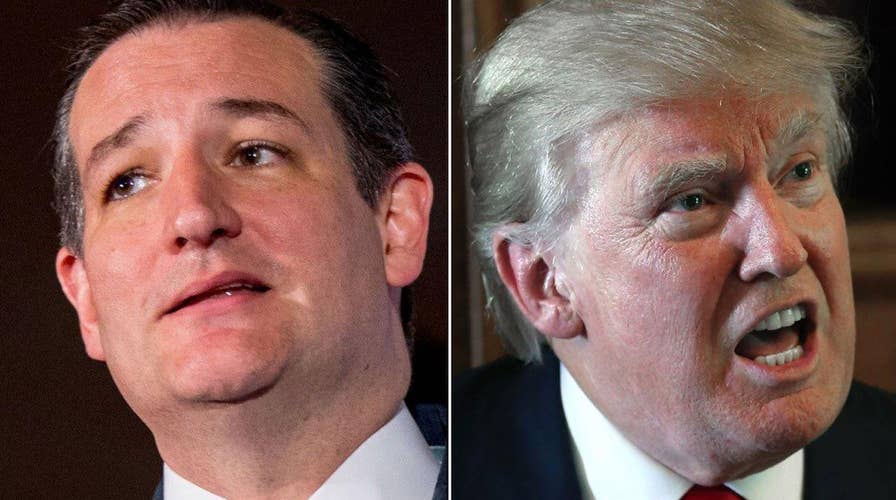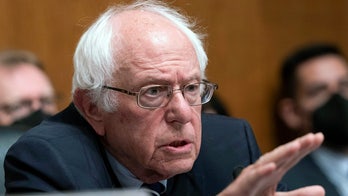Trump vs. Cruz rivalry continues to escalate
'The O'Reilly Factor' analyzes the GOP candidates' scathing attack ads against each other
Essentially everyone in Washington is freaking out about the blizzard.
But for several weeks now, many congressional Republicans have privately freaked out about the prospects of Donald Trump or, to a lesser degree, Sen. Ted Cruz, R-Texas, emerging as the party’s standard-bearer in the presidential sweepstakes.
The theory is that both candidates are so polarizing that their electoral prospects will impale Republican candidates down the ballot.
Let’s start with the House. The GOP currently holds a 246-188 edge over Democrats. The current vacant seat belonged to former House Speaker John Boehner, R-Ohio, and is expected to stay in Republican hands. So for the sake of argument, let’s say it’s 247-188 in favor of the GOP. Democrats would have to flip a staggering net of 30 seats to reclaim control of the House.
Wheel out the schadenfreude.
Democrats would be rapturous at the prospects of rank-and-file Republicans having to defund Trump or Cruz -- or run away from them.
Democrats could probably put a substantial dent in that 30-seat Republican margin. But that’s expected in a presidential election year. It’s just a question of how many more seats a Trump or Cruz candidacy could turn to Democratic control.
But make no mistake: Knowledgeable sources on both sides of the aisle are clear that it would be almost impossible for Democrats to win back the House this cycle. That net gain of 30 seats is just too high a bar. The map favors Republicans.
There aren’t a lot of “swing” districts in which Democrats could steal a seat or two. Nothing is ever out of the question. But the likelihood of Democrats nabbing the House majority is low at this writing.
The Senate, however, is another story. Republicans already faced an uphill climb to retain their majority this fall. The GOP must defend 24 seats. Only 10 Democratic seats are up this cycle. Plus, it’s a presidential year. And, many of the Republican seats on the ballot are in “purple” states or states that President Obama won in 2008 and 2012.
For the GOP, Sens. Ron Johnson, Wis., Mark Kirk, Ill., Rob Portman, Ohio, Kelly Ayotte, N.H., Pat Toomey, Pa., and Richard Burr, N.C., are running in competitive states. Democrats would also like to win the seat now held by GOP Florida Sen. Marco Rubio, who is running for president and not seeking re-election to the Senate.
Democrats must also defend the seat of Sen. Michael Bennet, Colo., and the seat of retiring Senate Minority Leader Harry Reid, Nevada.
Colorado and Nevada are potential GOP pickups. Republicans currently hold a 54-46 advantage over the Democrats in the Senate (two independent senators caucus with the Democrats).
So a net gain of five seats isn’t out of the realm for Democrats. Many political theorists think those seats in swing states could all tilt to the Democratic side if Trump or Cruz is the nominee.
This pariah status for Trump and Cruz is rare. On Thursday, a reporter asked Sen. Lindsey Graham, R-S.C., whether he preferred Cruz over Trump.
“It’s like being shot or poisoned. It doesn’t really matter,” replied Graham. “Donald Trump is the most-unprepared person I’ve ever met to be commander-in-chief.”
With friends like these….
Last week, House and Senate Republicans huddled jointly in Baltimore for their annual issues retreat. Much of the conversation focused on an approach to fighting ISIS, terrorism and polling. Trump and Cruz weren’t there.
But their specter haunted the entire confab. As a result, Republican leaders tried to present a positive image and sidestep internecine battles that loom inside the party.
“What happens above us on the presidential campaign is out of our control. So you try to control what you can control,” said Senate Republican Conference Chairman John Thune, S.D.
When asked about the eventual nominee, Thune left scribes with a less-than-confident answer that spoke deeply to Republican divisions.
“Hopefully we’ll be able to sync up with their agenda,” he said about the nominee.
House Majority Whip Steve Scalise, R-La., sought to deflect inquiries about the GOP chasms and pivoted to fissures among Democrats.
“I think if you look at the fractures, there are more on the Democratic side,” proffered Scalise. “Hillary Clinton hasn’t been able to close the deal yet. I think you are going to see a very united convention.”
The most-prominent issue next to Trump and Cruz is the unity of Republicans heading into the convention. Everyone seems to be talking about it -- except for House Speaker Paul Ryan, R-Wis.
The speaker dismissed a reporter’s inquiry who asked if he thought the GOP would conduct a brokered convention.
“That's ridiculous,” Ryan protested. “How do I know? I think that's ridiculous to talk about that.”
Even though people are talking about it….
And to hear Ryan and Scalise chatter, everyone will be in lockstep come convention time.
“We’re going to support whoever our nominee is because that’s the Republican primary voter’s decision,” Ryan said.
That’s where Democrats think they have Republicans in a fix if the GOP nominates Trump or Cruz.
Reid said he’d like to see the Senate vote on some of Trump’s policies - specifically the plan to ban Muslims from entering the U.S.
This is why Republicans fear Trump -- and why Democrats would love to put GOPers on the spot and exploit the schism.
Senate Majority Leader Mitch McConnell retorted that “what is good for the goose is good for the gander.” The Kentucky Republican argued he might concoct votes on the policy positions of Clinton or fellow Democratic Sen. Bernie Sanders, Independent-Vermont.
Adam Jentleson, a top aide to Reid, indicated to Fox that Democrats “would accept the deal McConnell proposed in a heartbeat -- votes on Trump’s policies in return for votes on Clinton/Sanders policies.”
In many respects, congressional Republicans are trying to rise above the fray.
“We need to appear like the sane ones,” said one senior House aide.
That’s why Ryan’s pushing a robust policy agenda and “vision” items this year.
“There’s a lot of us who believe this is a make or break year. We are going to build an agenda that is agnostic to our nominee,” said Texas GOP Rep. Bill Flores, chairman the Republican Study Committee, the largest bloc of conservatives in the House.
The agenda “is a key piece of infrastructure that any presidential nominee would need,” he said.
In short, House GOPers are hoping to “wag the dog” a little. If say Trump is the nominee and he propounds far-flung ideas, perhaps congressional Republicans can temper that red meat with bona fide policies that represent core values of the party.
But that doesn’t stop everyone from freaking out on Capitol Hill. Maybe Trump and Cruz already wagged the dog. And then those in Congress are the ones who look like they’re out of step with the nominee their party selects.





